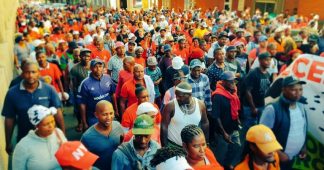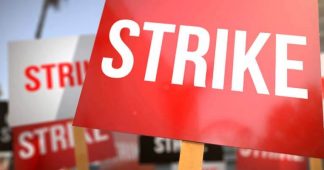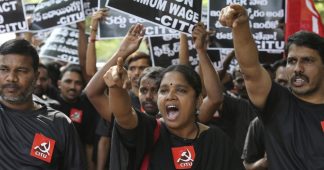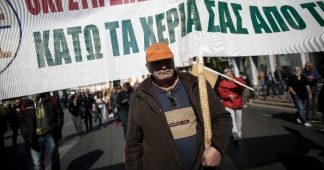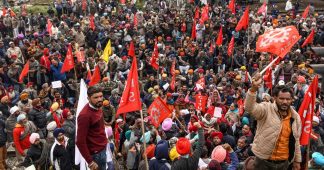Millions of workers took part in the general strike on February 24, according to the South African Federation of Trade Unions which called for the labor action. Demonstrations were held in a number of cities
by Pavan Kulkarni
February 25, 2021
Photo : SAFTU via Twitter
Workers across South Africa took part in a massive general strike that was called by the left-wing South African Federation of Trade Unions (SAFTU) on Wednesday, February 24. The trade union confederation reported that millions took part in the labor action which was described as a resounding success. Demonstrations were held across the country. In the Western Cape province, police attacked the protesters and detained union leaders.
SAFTU had called for the strike on the day of the presentation of the budget to highlight the need for a drastic change in policy to address the severe crisis faced by workers in the country. It raised a number of demands, including nationalization of all strategic monopoly industries, a “Basic Income Grant of R1,500” and a living minimum wage of at least R12,500 (USD $854), as well as community healthcare, public housing and a bar on evictions.
By raising demands that transcended the sectoral concerns of the workers organized by its affiliated unions, SAFTU had appealed to the cross-section of South African working class to participate in the strike, regardless of which union they are affiliated to and regardless of whether or not they are unionized.
The success of this appeal was evident in the fact that the number of workers who downed tools far-exceeded the roughly 800,000 members represented by the unions affiliated to the federation.
“Today workers sent an unequivocal statement that.. (we) will not normalize the completely abnormal situation of worsening unemployment, poverty and inequalities,” SAFTU said in a statement after the strike, adding that many sectors of the economy had “grounded to a halt. This is precisely the statement we want to make that the global crisis of capitalism should not be resolved at the backs of the working class and the poorest of the poor.”
Complying with the level 3 lockdown regulations still in place in the backdrop of the ongoing COVID-19 pandemic, most participants in the strike were asked to stay home and not report to work. Only a few hundreds of unionists took to demonstrating on streets in the major cities – while wearing masks – in order to be able to follow the appropriate physical distancing norms.
Such demonstrations were held in Cape Town, Bisho, Nelson Mandela Metro, Bloemfontein, Welkom, Mahikeng, Johannesburg, Pretoria and Durban
Mametlwe Sebei, the president of General Industries Workers Union of South Africa (GIWUSA), which was a participant in the labor action, told Peoples Dispatch, “We debated extensively about the exact form of the strike because of the particularly virulent strain of COVID-19 currently ravaging the country. We settled for the stay away, with limited actions of motorcades and small protests by activists across the country.”
Despite this moderation shown by the unions, the police fired tear gas and used force to arrest the Western Cape region’s SAFTU Provincial Secretary, Andre Adams, and the region’s chairperson of Democratic Municipal and Allied Workers Union of South Africa (DEMAWUSA), Nadine Simons.
Condemning this police action, SAFTU’s General Secretary, Zwelinzima Vavi, pointed out that the federation and its affiliated unions had taken all measures to comply with the regulations. “All our members had masks, sanitizers and observed social distancing,” he said.
“Still, the police came with a two-line barb wire, surrounded the protestors, and ordered them to disperse. As law-abiding citizens, they complied and went into their cars to drive off; the police ordered them to ‘go home’ and pepper-sprayed them.”
Vavi compared this treatment of the protesting unionists with “how the police treated thousands of the rich who.. (descended) on the Cape Town beaches, defiantly wearing no masks and maintaining no social distancing.”
“On this occasion, the police did not bring barbwire, batons, guns, pepper sprays etc. Instead.. the President hurriedly called a press conference to announce the lifting of the ban on swimming on the beaches, rivers and lakes.. (and) allowed restaurants to sell liquor and met most of the demands of the capitalist class.. This serves as a reminder that despite the official ending of Apartheid in 1994, racism lives on.. (W)e are reminded that the state is an instrument of class rule.”
“The behavior of the.. (police) today re-enforces the fact that this government is not a government of the masses,” added National Union of Metalworkers of South Africa (NUMSA) general secretary, Irvin Jim. “It serves only the interests of the extremely wealthy, mostly white elite, against the interest of the working class and the poor who make up the Black and African majority.” NUMSA, a constituent of SAFTU, is the country’s largest union, with a membership of around 400,000.
Similar was the class analysis of the ANC by its own labor ally, the Congress of South African Trade Unions (COSATU). Declaring support to the general strike called for by SAFTU, COSATU had said in a statement, “COSATU National Office Bearers would have loved to join the strike side-by-side with SAFTU, but the strike coincided with federation’s three-day Central Executive Committee meeting. We call on all the workers and the people of South Africa to support the SAFTU strike for a dignified life, and decent jobs for all working people.”
The largest trade union federation in the country, COSATU had given the call for the previous general strike in October 2020, which it had led jointly with SAFTU and other federations, setting a historic precedent of working class unity cutting across the ideological affiliations.
Speaking to Peoples Dispatch at the time, Sizme Pamla, the national spokesperson of COSATU, had said, “What is different this time is the realization that the ANC has betrayed the working class.”
The engagement between the unions is likely to continue in the aftermath of Wednesday’s strike. “We are having a meeting with the communities on Friday and we will be engaging with other Federations like FEDUSA, NACTU and COSATU which issued the statement of support, and independent unions like the mine workers union, AMCU.. to discuss the way forward and further actions,” Mametlwe Sebei told Peoples Dispatch.
“The task”, he adds, “is to build a united mass movement of workers, communities, youth and activists in climate, gender and migrant justice movements that can roll back the onslaught on the working class, the austerity budget and measures offloading the burden of the crisis on the shoulders of the working class.”
Published at peoplesdispatch.org
